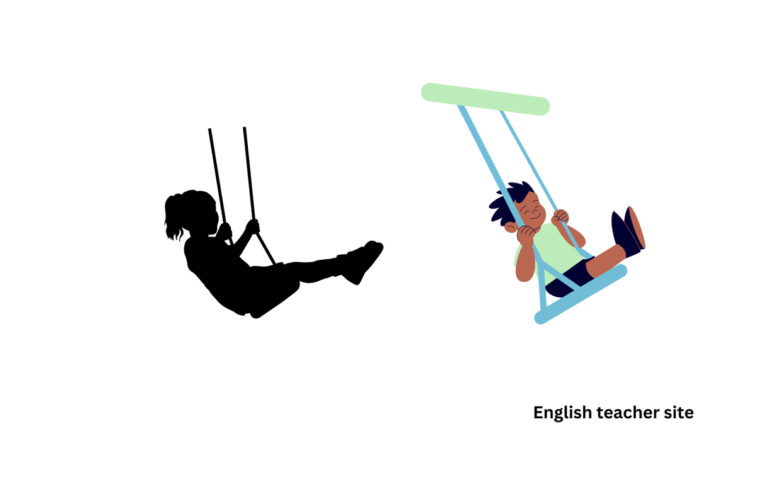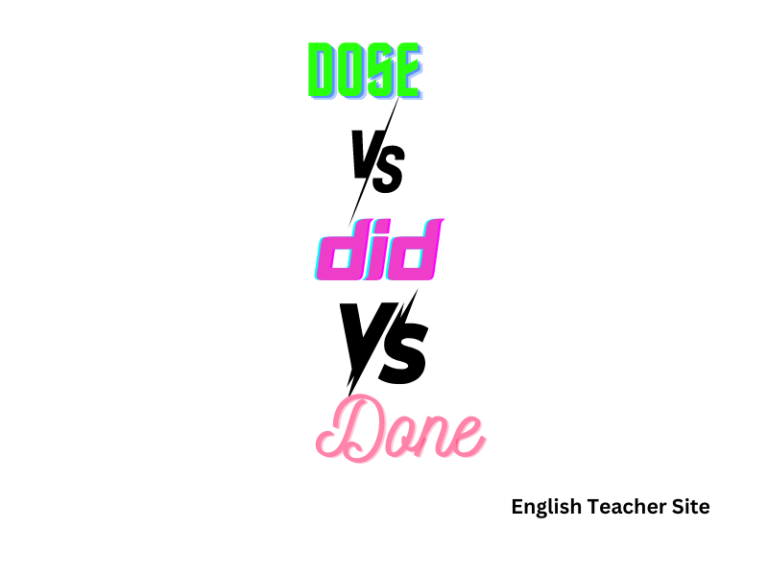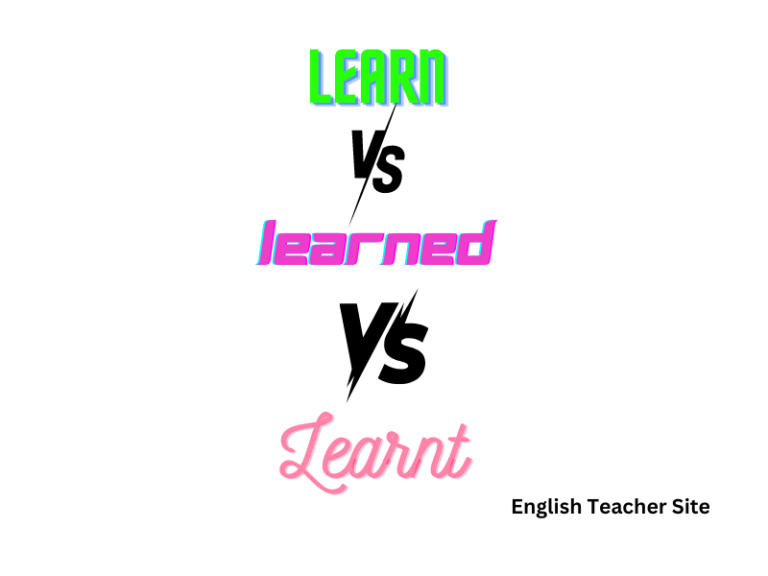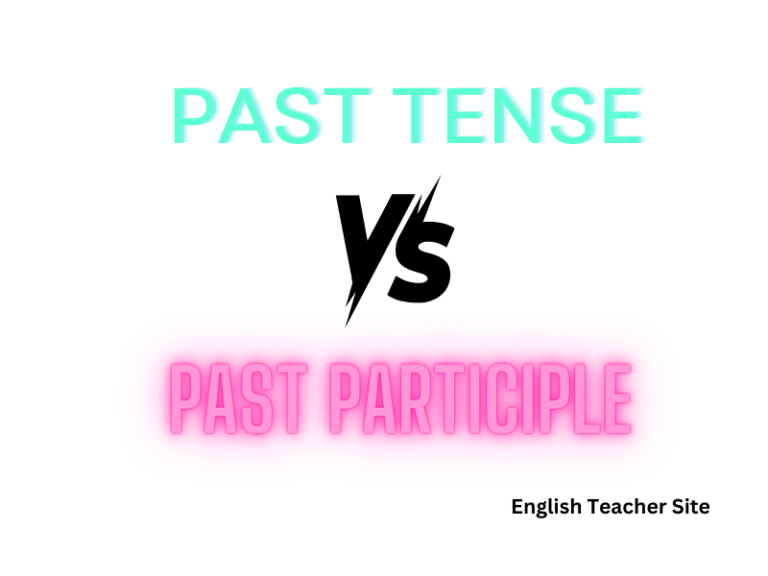Whats the Past Tense of Break: Understanding Broke and Broken
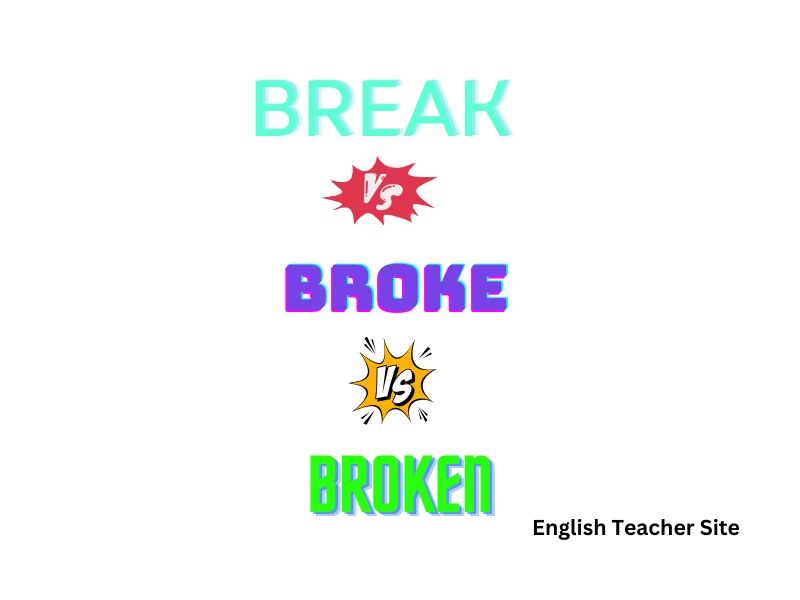
- “Broke” is the simple past tense form, while “broken” is the past participle.
- The verb “break” is irregular, defying the standard “-ed” past tense ending.
- Proper use of “broke” and “broken” depends on the verb tense being employed.
The simple past tense “broke” describes an action that was completed in the past. For instance, you might say, “The vase broke when it fell off the shelf.” On the other hand, “broken” is used as the past participle in perfect tenses. For example, “The window has been broken for weeks.” The irregular nature of “break” means that it does not follow the regular verb pattern of adding “-ed” to create the past tense forms.
What’s the Past Tense of Break: Break, Broke, Broken
The verb takes different forms depending on the tense, and it can sometimes be confusing to remember the correct usage.
Exploring the past tense forms of the verb “break”
The verb “break” is an irregular verb, meaning it does not follow the regular convention of adding “-ed” to create the past tense.
Simple Past Tense:
| Subject | Verb |
|---|---|
| I | broke |
| You | broke |
| He/She/It | broke |
| We | broke |
| They | broke |
In this tense, “broke” indicates an action that was completed in the past.
Past Participle:
| Subject | Auxiliary Verb | Past Participle |
|---|---|---|
| He/She/It | has/have | broken |
| I/You/We/They | have | broken |
The past participle form “broken” is used with an auxiliary verb to form the present perfect tense.
Here are a few examples that illustrate how “broke” and “broken” are used in sentences:
- The vase broke when it was knocked off the table.
- All the windows had broken during the storm.
Is It Broken or Broke? What’s the Past Tense of Break?
“Break” is an irregular verb, meaning that its past forms do not follow a regular pattern, such as verbs that simply add “-ed” for the past tense.
Table 1: Verb Forms of “Break”
| Base Form | Past Tense | Past Participle |
|---|---|---|
| break | broke | broken |
The past tense of “break” is broke. It is used to describe an action that was completed in the past. For example:
- Yesterday, she broke her favorite vase.
In contrast, “broken” is the past participle form and is used differently:
- With auxiliary verbs to form perfect tenses: She has broken the record.
- As an adjective: The toy is broken.
Table 2: Correct Usage Examples
| Tense | Example Sentence |
|---|---|
| Simple Past Tense | He broke the glass last night. |
| Present Perfect Tense | They have broken the agreement. |
| Past Participle (as an adjective) | The radio is broken. |
- Use “broke” when referring to the simple past.
- Use “broken” either with auxiliary verbs for perfect constructions or as an adjective.
Verb Forms of Break
The verb “break” is an irregular verb, which means it does not follow the standard rules of conjugation applied to regular verbs.
Primary Forms of Break:
- Base Form (Infinitive): break
- Past Simple: broke
- Past Participle: broken
Here is a summary of various tenses using the verb “break”:
| Tense | Example Sentence |
|---|---|
| Present | I/You/We/They break the glass |
| Present Continuous | He/She/It is breaking the glass |
| Present Perfect | I have broken the glass |
Past Forms of Break:
The past forms are especially important to learn due to their irregular nature:
| Tense | Example Sentence |
|---|---|
| Simple Past | He broke the glass yesterday. |
| Past Continuous | They were breaking the glass when I arrived. |
| Past Perfect | By the time we got there, she had already broken the glass. |
The verb “break” takes on different forms to indicate time and context within sentences:
- Actions in progress: “The children are breaking the crackers.“
- Actions completed in the past: “They broke their toys.“
- Results of past actions affecting the present: “The window has broken.“
These forms can also be incorporated into passive voice constructions and conditional sentences, adding further versatility to the verb “break”:
- Passive: “The window was broken during the storm.“
- Conditional: “If you broke the vase, you would have to pay for it.“
Usage Note: Broke
The past tense of the verb “to break” is broke.
Examples of ‘Broke’ in Sentences:
- She broke the glass when she dropped it.
- The news broke last night.
- He broke his leg skiing.
The use of “broke” is exclusively for the simple past tense, indicating an action completed in the past. It cannot be used for the present or future tense.
Conjugation of ‘To Break’:
| Tense | Conjugation |
|---|---|
| Simple Past | broke |
| Past Participle | broken |
In the table above, notice that “broken” serves as the past participle form, which is used with auxiliary verbs to form perfect tenses.
Perfect Tenses Using ‘Broken’:
- Present Perfect: I have broken the code.
- Past Perfect: They had broken the record before it was disqualified.
- Future Perfect: She will have broken the silence by tomorrow.
It’s important to avoid confusion between “broke” and “broken,” as they serve different grammatical functions. Here are some bullet points to remember:
- Broke is simple past and can stand alone (He broke the vase).
- Broken is the past participle, used with an auxiliary verb (The vase has been broken).
What’s the Past Tense of Break? Is Break a Regular or Irregular Verb?
When considering the verb “break,” it is important to understand its past tense formation and its classification as a regular or irregular verb.
Categorizing Verb Type
Regular Verbs are those that form their past tense and past participle by adding “-ed” or “-d” to the base form. For example:
| Base Form | Past Tense | Past Participle |
|---|---|---|
| play | played | played |
| wash | washed | washed |
Irregular Verbs, on the other hand, do not follow a set pattern when transitioning from present to past tense. The verb “break” is an irregular verb, which means its past forms are unique. Here is how “break” changes:
| Base Form | Past Tense | Past Participle |
|---|---|---|
| break | broke | broken |
Broke vs. Broken: Which to Use When
“Broke” is the simple past tense. It’s used to describe an action that occurred and was completed at a specific time in the past. Example applications in sentences are:
- She inadvertently broke the window yesterday.
- They broke their promise last week.
Conversely, “broken” is the past participle form which needs an auxiliary verb to accompany it, like “has” or “had.” It often conveys a state that is the result of a past action, such as in:
- The window has been broken.
- Promises that have been broken should not be forgotten.
Here’s a comparison to highlight their usage:
| Situation | “Broke” Example | “Broken” Example |
|---|---|---|
| Completed Action | He broke his watch when he dropped it. | The watch had already been broken. |
| Ongoing Relevance | They broke up last month. | Their relationship is broken. |
To summarize, use broke for actions completed in the past and broken when emphasizing the current state resulting from a past action. Bullet points to remember include:
- Broke is past simple for when the exact time is known.
- Broken is past participle needing an auxiliary verb.
- Broke typically does not appear with has, have, or had.
- Broken conveys a condition or state resulting from being “broken.”
Examples of the Word Break Used in Sentences
The verb “break” has a dynamic nature and can be applied in various contexts. This section presents examples demonstrating how to use “break” in its base form.
| Subject | Sentence Example with “Break” |
|---|---|
| He | He needs to break the news to her. |
| They | They often break for lunch at noon. |
| The glass | The glass will break if dropped. |
The versatility of “break” is evident through its conjugation in different tenses. Below, examples are provided to illustrate its use in present tense sentences.
- She breaks the stereotype with her unconventional methods.
- The teacher often breaks the class into groups for discussions.
Bold emphasis can be established for instructional purposes or to highlight a critical aspect of the verb’s use:
- It is crucial to know when break applies to a situation indicating a pause or interruption.
- The phrase break the ice serves as a metaphor for initiating a conversation.
| Tense | Example Sentence |
|---|---|
| Present | I break my fast at sunrise. |
| Present Continuous | They are breaking the record for the longest game. |
In educational settings, bullet points offer a concise way to list examples:
- Break can indicate physical separation: She will break the bread into pieces.
- Break may be used figuratively: They need to break free from bad habits.
Examples of the Word “Broke” Used in Sentences
This section will illustrate how “broke” is utilized within various sentence constructs.
The Simple Past Tense
The most straightforward use of “broke” is in the simple past tense, signifying that an action was completed at a specific time in the past.
- Examples:
- She broke her glasses yesterday.
- They broke the news to me last night.
| Subject | Sentence with “Broke” |
|---|---|
| He | He broke the world record. |
| She | She broke into a fit of laughter. |
| They | They broke through the barriers. |
| It | It broke off from the main group. |
The Use in Compound Sentences
“Broke” also appears in compound sentences where two independent clauses are connected by a conjunction.
- Examples:
- The storm broke the power lines, and we were left in the dark.
- Jim broke the vase, but he promised to replace it.
| Conjunction | Sentence with “Broke” |
|---|---|
| and | He broke the code, and the mystery was finally solved. |
| but | She broke the record, but she still strives for improvement. |
In the Passive Voice
When constructing sentences in the passive voice, “broke” can be used to emphasize the action rather than the subject.
- Examples:
- The windows were broken during the storm.
- Trust once broken is hard to restore.
Use in idiomatic expressions can showcase the versatility of “broke.”
- Examples:
- When they realized the company was going bankrupt, they knew they were going broke.
- After buying the expensive car, he is basically broke.
Understanding the proper use of “broke” can significantly enhance one’s command of past tense narration. Bullet points illustrate the different contexts:
- A physical object being damaged: The toy broke when it fell.
- A situation or abstract concept: The team’s spirit broke after the loss.
- Financial insolvency: After the investment failed, she went broke.
- Informal settings: Sorry, I can’t join the party; I’m broke until payday.
In each instance, “broke” conveys a sense of finality and change from a previous state, adhering to its definition as the past tense of “break.”
Examples of the Word Broken Used in Sentences
The past participle form of the verb “break” is “broken.” This form is often used in perfect tenses and passive voice constructions. Let’s consider its appropriate usage in sentences.
In Passive Sentences:
- The vase was broken by the errant baseball.
- Trust once broken is hard to repair.
In Perfect Tenses:
- She has broken the world record.
- They had broken down the barriers that separated them.
When utilizing “broken” in sentences, it conveys that an action has been completed, often resulting in a changed state or condition. Below are tables showcasing sentences with “broken” in different grammatical contexts:
Table 1: Broken in Various Tenses
| Tense | Sentence |
|---|---|
| Present Perfect | The code has finally been broken. |
| Past Perfect | By the time help arrived, the door had been broken. |
| Future Perfect | He will have broken all previous records by then. |
Table 2: Broken in Conditional and Modal Forms
| Form | Sentence |
|---|---|
| Conditional | If it’s broken, don’t try to fix it yourself. |
| Modal (can) | This toy can’t be broken easily. |
| Modal (must) | The contract must be broken if conditions change. |
Here are additional examples using bullet points for clarity:
- The agreement was broken due to non-compliance.
- Broken dreams don’t mean a broken future.
- The horse was eventually broken and trained for riding.
Origin of the Word Break
The term break has a significant and nuanced history in the English language. It originated from the Old English word brecan, which means to break, fracture, or burst. The roots of the word extend further back to the Proto-Germanic brekanan, which has a similar meaning.
| Origin | Definition | Language |
|---|---|---|
| brecan | to break, fracture, or burst | Old English |
| brekanan | similar to ‘to break’ | Proto-Germanic |
During the evolution of English, the past tense of break has undergone changes. Initially, brake was the accepted past tense form, which is echoed in other Germanic languages like German, where the past forms are brach and gebrochen. Over time, brake fell out of common usage and was supplanted by broke.
- brake → archaic past tense of break
- broke → evolved past tense of break
As the English language developed, the past participle also transitioned from broken to the simpler broke, but the former remained the more acceptable form in modern usage. The versatility of the word is reflected in its application, from physical breaking to more metaphoric uses such as breaking the dawn.
| Past Tense | Past Participle |
|---|---|
| broke (common) | broken (standard) |
| brake (archaic) | broke (historical usage) |
The perpetual motion of language evolution ensures that words like break continue to be dynamic, adapting to the needs and conventions of its speakers. The rich history of break from its Old English roots to contemporary use showcases the intricacy and adaptability inherent in linguistic development.
Source
- Etymology online, origin of break.
- Theasaurus.com, synonyms of break.
My name is Khamis Maiouf. I am the creator of the English Teacher Site, dedicated to providing valuable resources and insights for students around the world. With a passion for education and a commitment to helping students enhance their skills, I aim to make English teaching more effective and enjoyable for both educators and students.

